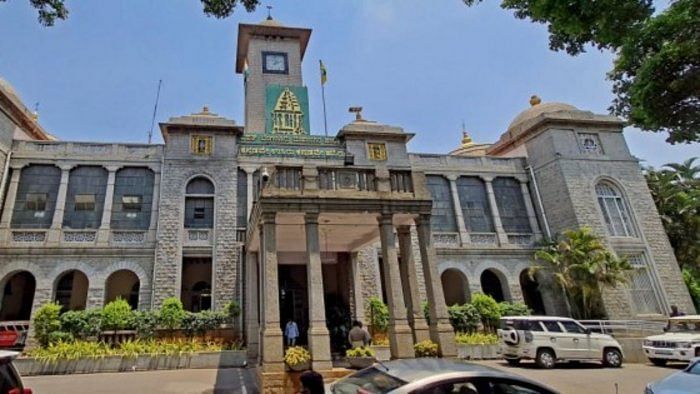
BBMP Office.
Credit: DH Photo
Over the last two decades, particularly when financial resources are crunched, one gets a sense of déjà vu when the leadership makes statements of how the Bruhat Bengaluru Mahanagara Palike’s (BBMP) property tax collections are way below potential and how we need to do something about it.
Recently, the Bengaluru Development Minister felt property tax of Rs 3,000 crores (including arrears) annually was low. He advocated an inspection and enforcement drive to get property owners to pay their due share.
Over eight years ago, the Government of India Economic Survey indicated that Bengaluru collects only a fifth of its potential. It does seem we are leaving something between Rs 3,000-9,000 crores uncollected, depending on whom you listen to.
A problem in the BBMP’s structural set-up is that the person (or office) indicating the property tax target for the year is the person who is also in charge of ensuring collections. Consequently, considerable perverse incentives exist to understate the potential while looking good in terms of a high percentage collected vis-a-vis targets.
Unless different departments handle these two roles, and they are measured by proving the potential exists and collection efficiency, respectively, the bane of lower property tax collection will be perpetual. And the city will be the loser.
How tax slips through cracks
Firstly, all properties are not in the tax net. Many existing buildings on the ground do not appear in BBMP records. Even where properties (including large campuses) are listed, the built-up square feet area shown for taxation is often way below the actual reality.
The property GIS database is way off the mark, with no proper geocoordinates for each property. No system for transferring newly cleared plans or occupancy certificates into the property database exists. One wonders if there are cosy arrangements between the field officials and the owners since it is common knowledge that BBMP officials are aware of every construction activity in the city. And if such arrangements do exist, how can the same people fix the problem?
The two areas where there is considerable misreporting are owner-occupied/rental status and whether residential/commercial. The taxes in the latter cases are twice the former’s rates. The rental status can easily be fixed if BBMP can get the courts to request for property tax payment classification before admitting any tenancy dispute cases—few owners will risk their inability to go to court against the tenant for the savings a false declaration offers.
The commercial usage shown as residential can be tackled by sharing the databases between Bangalore Electricity Supply Company Limited (BESCOM), Bangalore Water Supply and Sewerage Board (BWSSB) and BBMP. For this, there is a need for a unique property ID to link the databases, and all agencies must follow a unique property ID not linked to the ward number. Thus far, there has been zero interest in getting this done.
Capital value vs presumed value
One standard solution to increase property tax collection is to shift to the Capital Value System, where the tax is levied as a percentage of the property’s market value. We do not have a transparent property pricing discovery system. The nearest proxy is guidance values that get revised upwards occasionally.
Our current self-assessment scheme (SAS) process can rezone the areas based on the new guidance value bands. But it is equally important from a citizen-friendly outlook to have the online property tax records reflect the new zoning for a property. The online system must be more user-friendly and intuitive and allow for changes to property with an appropriate verification process.
BBMP’s property tax collection can reach its true potential if we have the necessary political will, administrative commitment and law-abiding citizenry to work in tandem. The essence of the SAS was to trust the owner to tell the truth over expecting a revenue officer to uncover a lie.
It will help if the citizens see the money they pay as taxes being used wisely for better city infrastructure. If that does not happen, the existing trust deficit between citizens and the government will continue to widen.
(The author advocated SAS in 2000 at a Bangalore Agenda Task Force summit, which was later adopted by the BMP and BBMP)